41 primary container labels of hazardous chemicals
Shepherd University | Safety | Hazard Communication Chemical Labeling Primary container labels on hazardous chemicals and products provided by manufactures and suppliers are required to have six elements. The six elements are pictograms (see below), a signal word ("Danger" or "Warning"), hazard and precautionary statements, the product identifier (product/chemical name), and supplier information. Container Labeling: A Key to Compliance - Occupational Health & Safety Containers also must have the following identification on the container, label or tag [29 CFR 1910.1200 (f) (1)]: The identity of the hazardous chemical. Appropriate hazard warnings. The name and ...
GHS Labeling Requirements: The Definitive Guide [2021 Update ... - Luminer However, the GHS takes into consideration that, sometimes, it's not possible to keep workers safe with only these six label requirements, which is why it also allows for supplemental information. 1. Product Identifier. This requirement identifies the actual hazardous chemical inside the container.
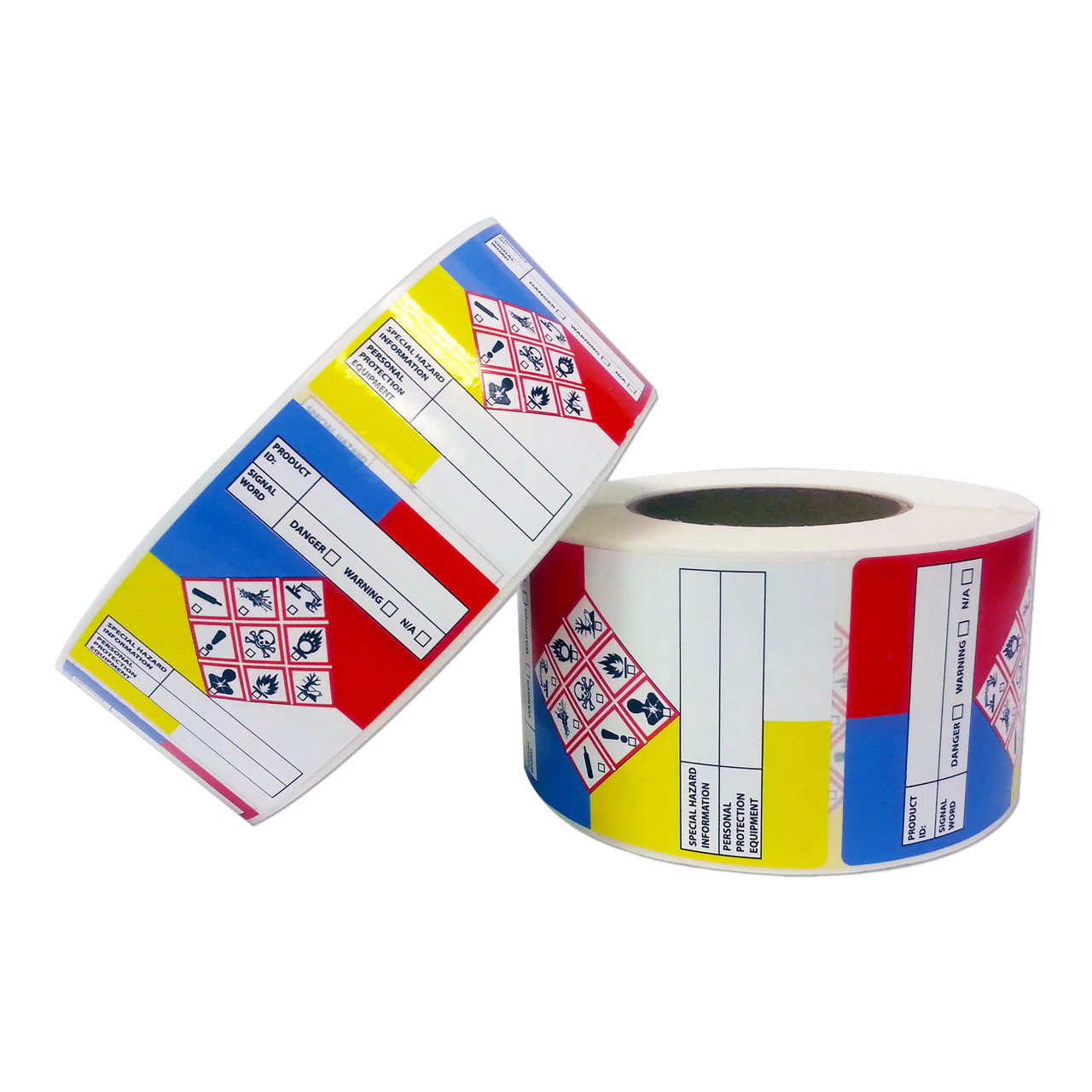
Primary container labels of hazardous chemicals
Secondary Container Labels 101: HazCom and WHMIS - ERA Environmental Everything you need to know about secondary container labels to comply with the Globally Harmonized System (GHS) SDS Management program in US and CAN. ... the identity of the hazardous chemicals within the product and the hazards ... and precautionary statements must be included on all primary labels [PDF]. Regarding hazardous material which ... Types of Containers and Labels - Occupational Health and Safety Blog Under the new HCS 2012, labels on containers shipped from manufacturers or distributors must be labeled, tagged or marked with the following six items: 1. Product Identifier - This should include the chemical identity of the substance. 2. Signal Word ‐ Signal words used in GHS are "Danger" and "Warning." Chemical Container Labeling - Northwest Safety The Hazard Communication Standard (HCS) describes chemical labels as information provided through a group of written, printed, or graphic appropriate elements concerning a hazardous chemical. These should be that placed on the immediate container of a hazardous chemical. The Hazard Communication Standard also is now known as the Right to Understand Standard, requires chemical manufacturers ...
Primary container labels of hazardous chemicals. Chemical labels | Environmental Health & Safety | Michigan State University Container Labels. All containers of hazardous chemicals must be labeled with the name of the chemical and the hazard (s), if not provided by the manufacturer. If a chemical has more than one hazard, it must be labeled with both hazards. For example, acetaldehyde is both a flammable and a carcinogen, and must be labeled appropriately. PDF BRIEF - Occupational Safety and Health Administration While the DOT diamond label is required for all hazardous chemicals on the outside shipping containers, chemicals in smaller containers inside the larger shipped container do not require the DOT diamond but do require the OSHA pictograms. (See Example 2.) Labels must be legible, in English, and prominently displayed. Other languages 4 Quick Tips to Help You Ace OSHA Secondary Container Labeling The original container in which a chemical arrives from the supplier is considered the primary container. The primary container label for a hazardous chemical should always be an OSHA-compliant GHS chemical label and contain all information needed to create a compliant secondary container label. Secondary Container Definition Labeling Laboratory Containers | Columbia | Research All laboratory containers, even those containing minimally hazardous materials such as water or buffer solutions, must be labeled. Writing the name of the material on the container is perfectly acceptable, but if you are interested in a more permanent solution, please consider the following labeling tools that EH&S has put together.
Rules for Proper Secondary Container Labeling - HSI Secondary Container Label Requirements. Employers must make sure that each container of hazardous chemicals in the workplace is labeled, tagged, or marked with either of the following: All the information specified for the labels on shipped containers. The hazard identification and words, pictures, symbols, or a combination that provide at ... Hazard Communication - Container Labeling - OSHAcademy free online training The HCS 2012 primary container label on the right provides an immediate visual reminder of the hazards of a chemical. However, it isn't necessary to list every hazard of the chemical on the label. ... The employer must ensure that each secondary container of hazardous chemicals in the workplace is labeled, tagged or marked with either: Labeling requirements of hazardous chemicals. | Occupational Safety and ... The using employer has the responsibility to ensure that each container of hazardous chemical in the workplace is labeled, tagged, or marked with the following information: i) Identity of the hazardous chemical (s); ii) Appropriate hazard warnings. Chemical Container Labeling - Syracuse University The manufacturer's container label must have specified elements including pictograms, signal words and hazard and precautionary statements which provide hazard information to the end user. The University must ensure manufacturer container labels are maintained in good condition and replaced when needed.
Container Labels | Environmental Health & Safety | Michigan State ... All containers of hazardous chemicals must be labeled with the name of the chemical and the hazard (s), if not provided by the manufacturer. If a chemical has more than one hazard, it must be labeled with both hazards. For example, acetaldehyde is both a flammable and a carcinogen, and must be labeled appropriately. Chemical Container Labels | EHS - University of Washington All hazardous chemical waste mus t be labeled with the UW label shown unless the material is still in its original manufacturer's container. Containers need to be labeled as soon as waste begins to be accumulated in them. Hazardous waste labels are available on the EH&S website. OSHA: Container Labels Flashcards | Quizlet The exclamation point mark pictogram represents a variety of hazard classes. Which of the following hazards could you expect if you see the pictogram? -Irritants -Skin sensitizers -Acute toxicity -Narcotic effects This pictogram represents three classes of hazards? -Skin corrosion and burns -Eye damage -Corrosive to metals Container Labeling and Other Forms of Warning - Virginia Tech Primary or Original Manufacturer's Labels Chemical manufacturers, importers, or distributors are required by OSHA to label, tag or mark each container of hazardous chemicals with the following label elements after they classify the hazards of the chemical. Virginia Tech employees must understand how to read and follow chemical labels.
Secondary Containers | Environmental Health, Safety and Emergency ... The OSHA citation is 29 CFR 1910.1200(f). Except for some exceptions that will rarely apply at ASU, "the employer shall ensure that each container of hazardous chemicals in the workplace is labeled, tagged or marked with the following information: Identity of the hazardous chemical(s) contained therein; and,
Chemical Container Label Requirement | EMC - EMC Insurance Each label must contain the following information: Identity of the material Signal word Hazard statement (s) Pictogram (s) Precautionary physical and health hazards associated with the material Name and address of the chemical manufacturer, importer or other responsible party
Proper Labeling Chemical Containers - Hazcom ... - OSHA Review The chemical manufacturer must ensure that primary label is marked with the following information: Product identifier - The name or number used for a hazardous chemical on a label or in the safety data sheet (SDS). Signal word - A word used to indicate the relative level of severity of hazard and alert the user to a potential hazard.
Healthcare Environmental Resource Center (HERC) HazCom requires that all containers of hazardous chemicals must be labeled, tagged, or marked with the identity of the material and appropriate hazard warnings. ... The primary information to be obtained from an OSHA-required label is the identity for the material and appropriate hazard warnings. The identity is any term which appears on the ...
Container Labeling | Office of Environmental Health and Safety | ECU Containers holding non-hazardous substances such as water must also be labeled to avoid confusion with other clear and colorless chemicals. It is acceptable to label these containers "Non-Hazardous". Safety label templates are available to you (will be linked). It is not required that you use these specific labels. Resources
Chemical Hazardous Waste Containers: EPA and DOT Labeling Requirements A container used for chemical hazmat onsite storage must be marked with the words "Hazardous Waste." It must also exhibit the starting date for its accumulation along with information about its contents (e.g., toxic, reactive, ignitable, or corrosive). If you're reusing a container, make sure to remove the old labels.
What Required Information Must GHS Labels Include? - MPC Secondary containers are typically used by employers that make use of hazardous chemicals and products received from manufacturers. ... Here's a look at each requirement for GHS-compliant primary container labels. Signal word - The signal word, such as "Danger," or "Warning," is used to indicate the hazard level. Danger indicates ...
Reference Guide to GHS Container Labels - UArizona Research, Innovation ... There are six required sections of a GHS-compliant chemical container label: Product Identifiers GHS Pictograms Signal Words Hazard Statements Precautionary Statements Supplier Identification 1. Product Identifiers The product identifier is most often the common product name of the chemical, and must match the product identifier on the SDS.
PDF HEALTH & SAFETY Chemical Container Labeling Although OSHA regulations require labeling only those containers with hazardous chemicals, EH&S recommends all non-hazardous chemical containers be labeled with the product identity in order to minimize confusion. In the event there is a chemical with no OSHA hazard, then a label will make that fact obvious.
What is the Difference between Primary and Secondary Chemical Containers? Both primary and secondary containers must be labeled. According to 1910.1200 (f) (7), however, the employer is not required to label portable containers into which hazardous chemicals are transferred from labeled containers, and which are intended only for the immediate use of the employee who performs the transfer.
Chemical Container Labeling - Northwest Safety The Hazard Communication Standard (HCS) describes chemical labels as information provided through a group of written, printed, or graphic appropriate elements concerning a hazardous chemical. These should be that placed on the immediate container of a hazardous chemical. The Hazard Communication Standard also is now known as the Right to Understand Standard, requires chemical manufacturers ...
Types of Containers and Labels - Occupational Health and Safety Blog Under the new HCS 2012, labels on containers shipped from manufacturers or distributors must be labeled, tagged or marked with the following six items: 1. Product Identifier - This should include the chemical identity of the substance. 2. Signal Word ‐ Signal words used in GHS are "Danger" and "Warning."
Secondary Container Labels 101: HazCom and WHMIS - ERA Environmental Everything you need to know about secondary container labels to comply with the Globally Harmonized System (GHS) SDS Management program in US and CAN. ... the identity of the hazardous chemicals within the product and the hazards ... and precautionary statements must be included on all primary labels [PDF]. Regarding hazardous material which ...
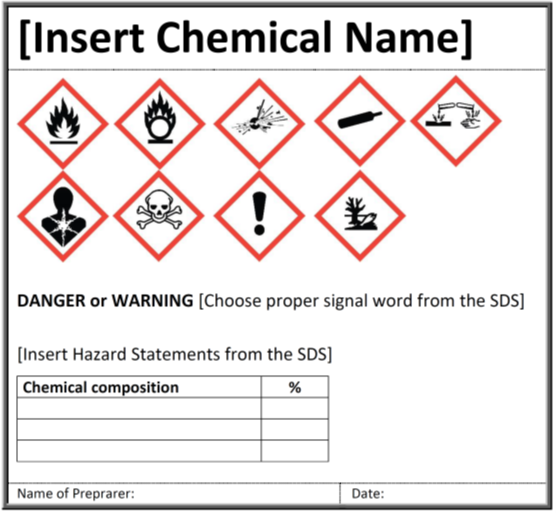
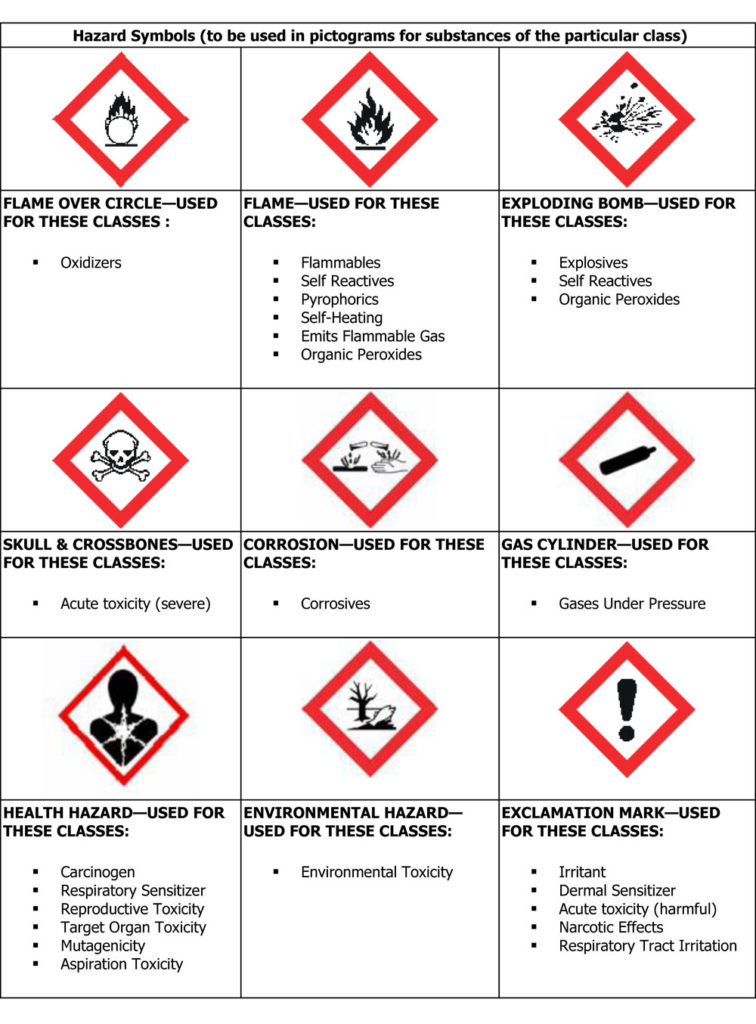

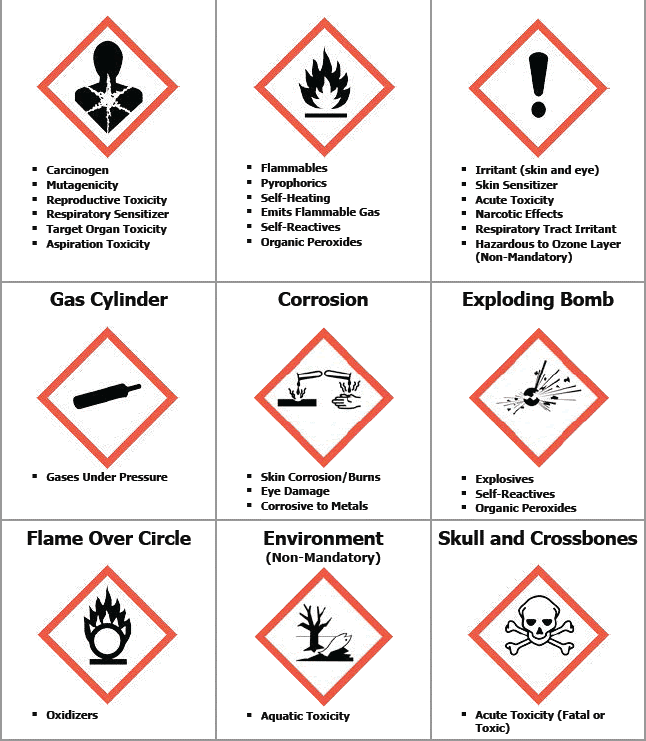
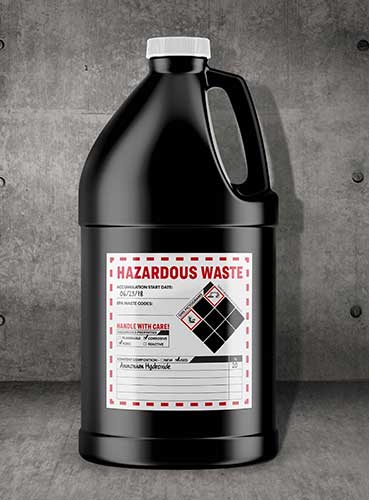


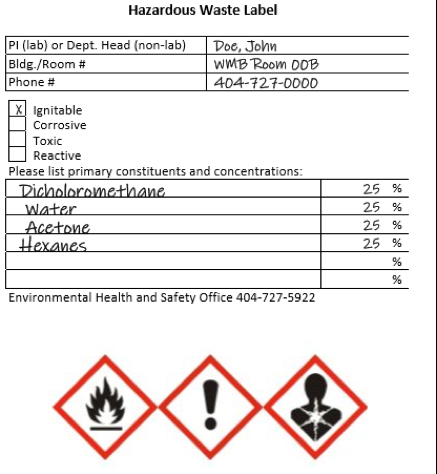
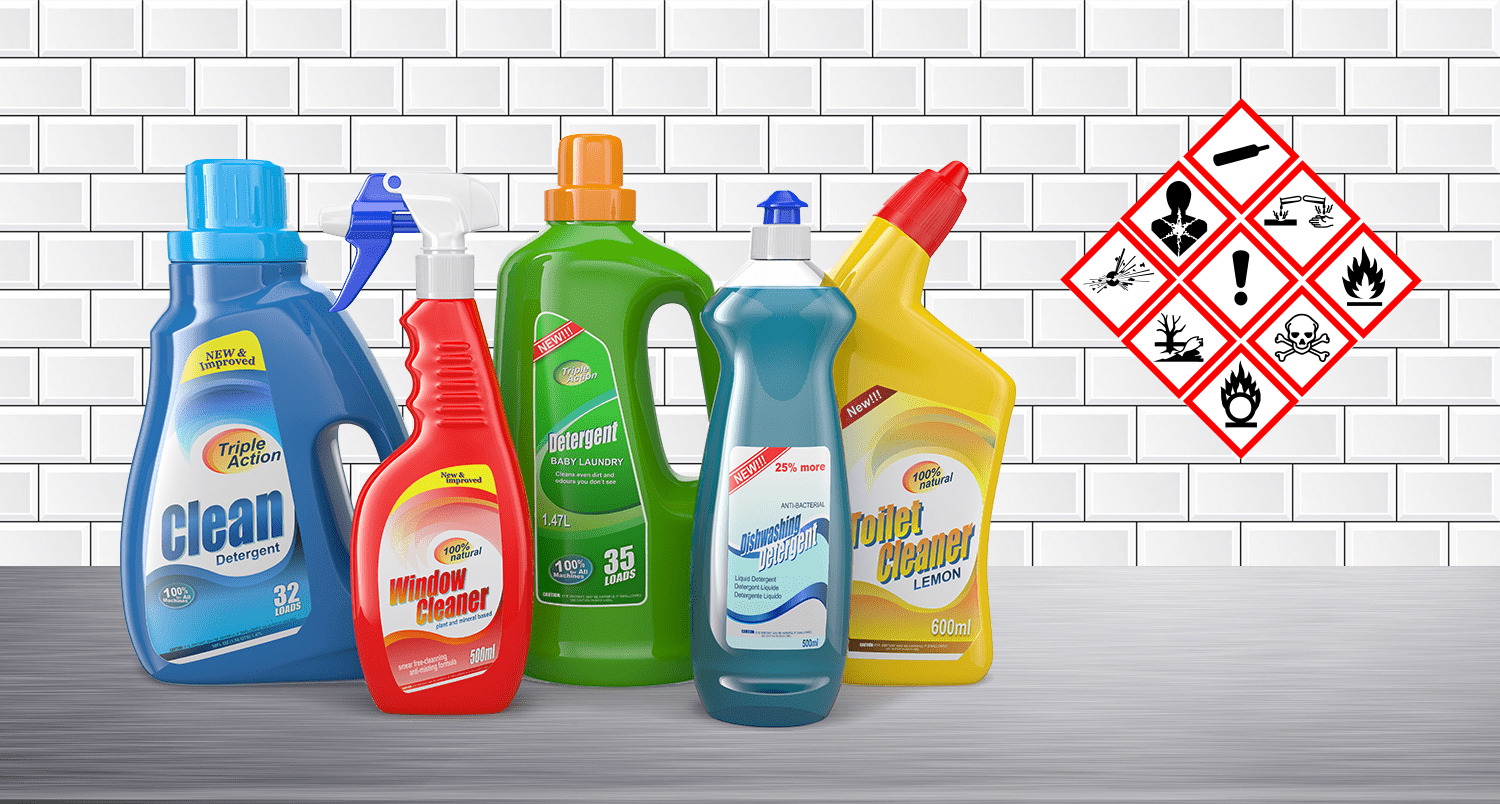
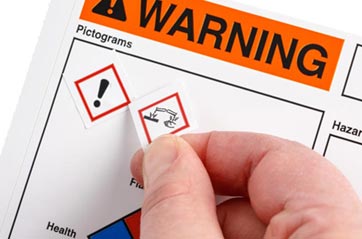

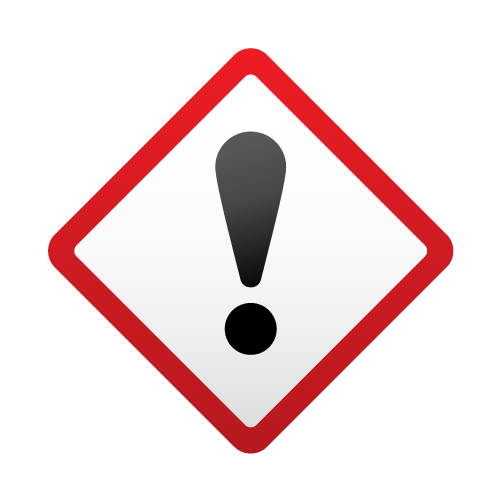
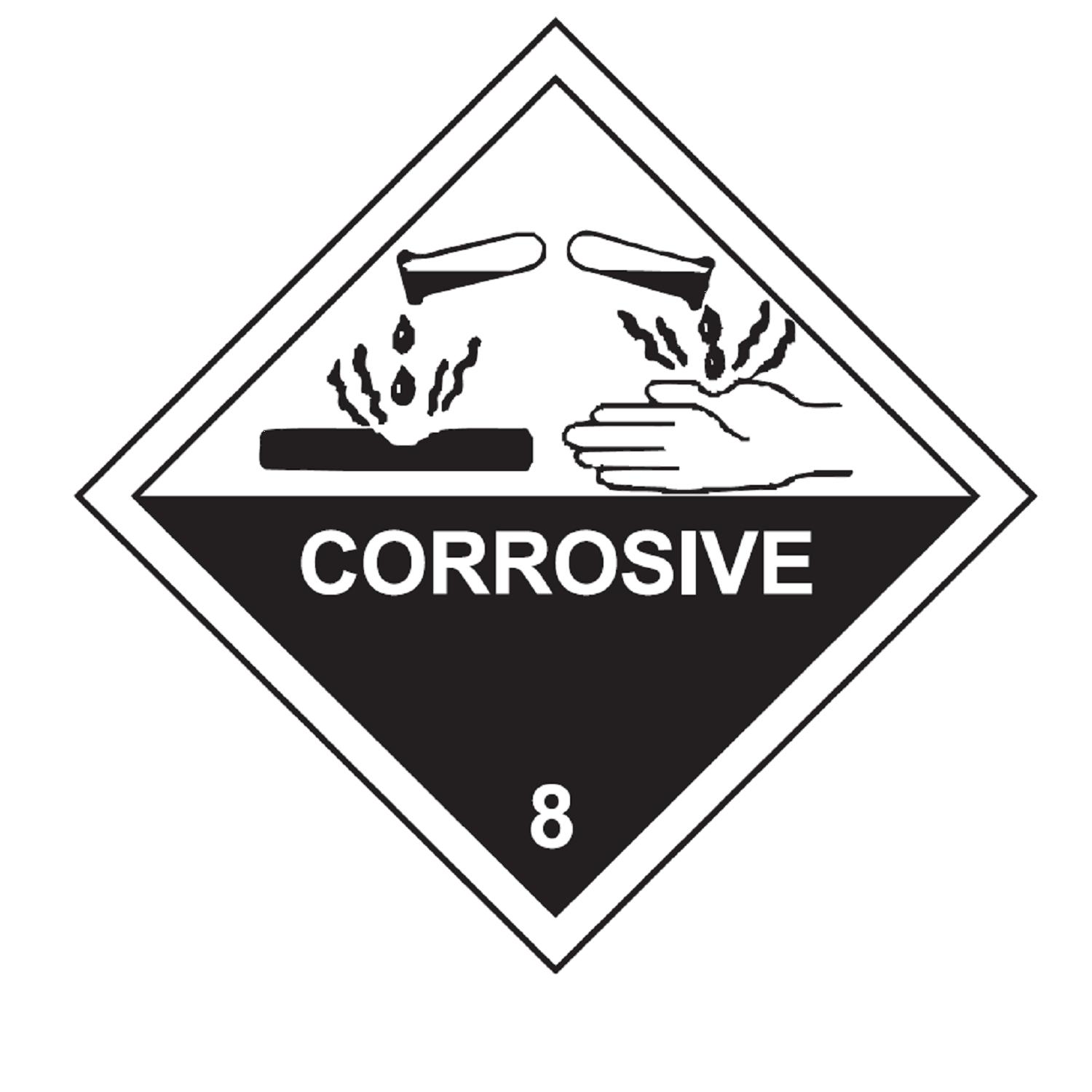
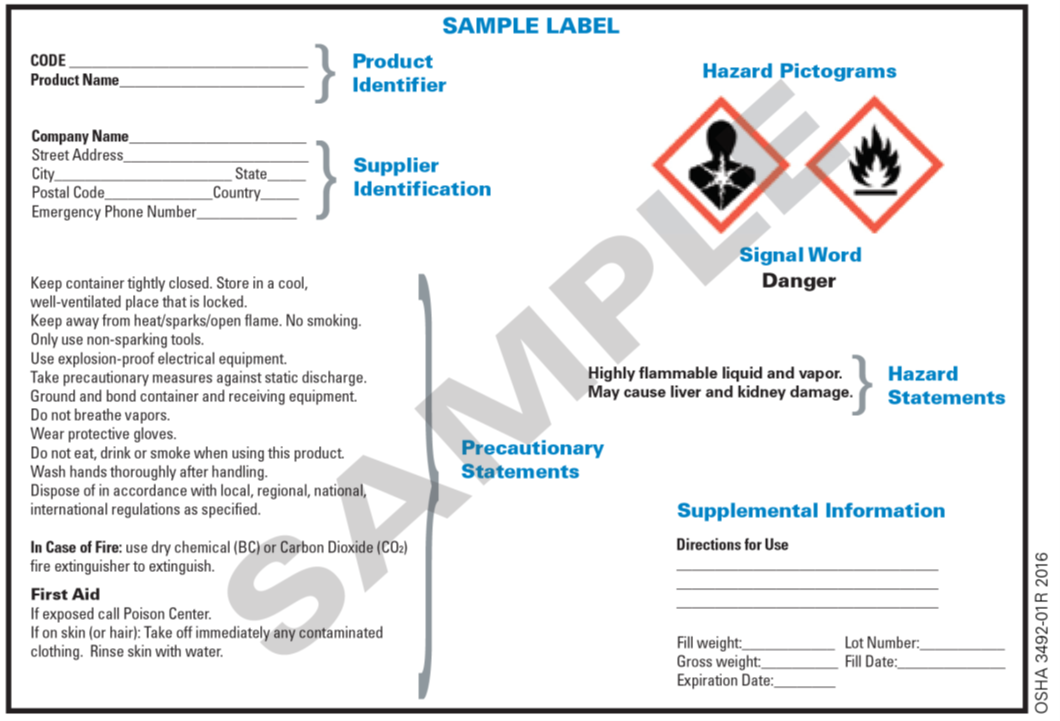
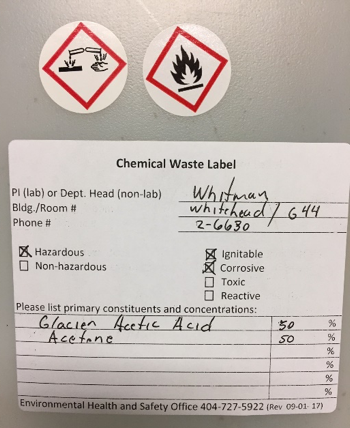
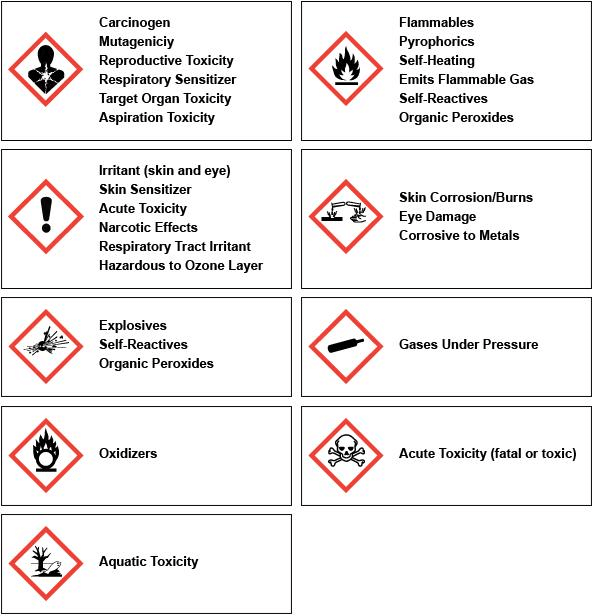





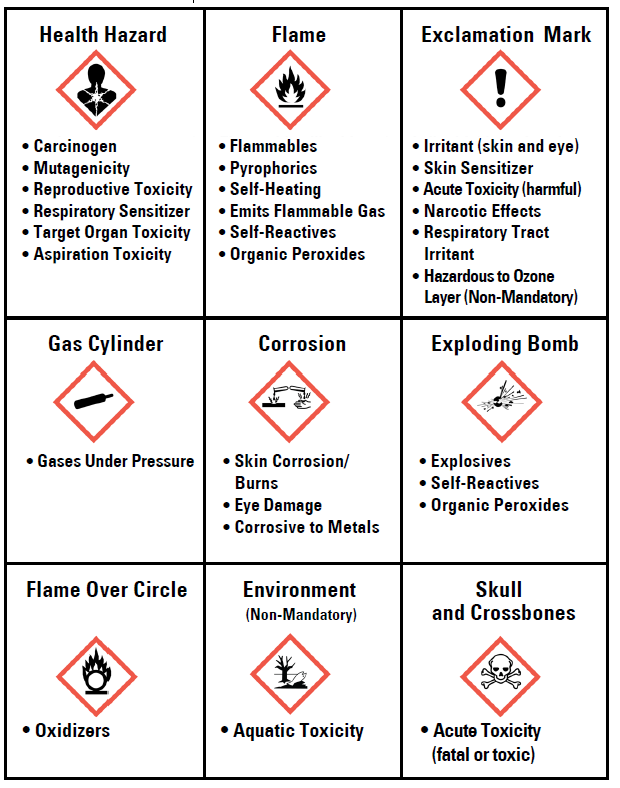
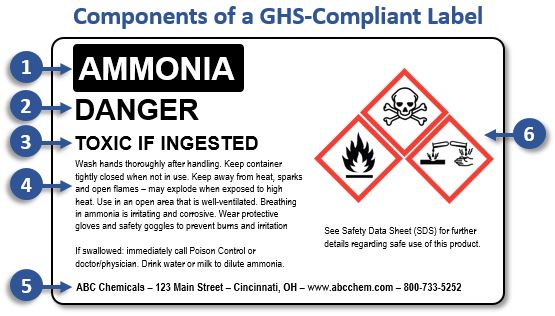

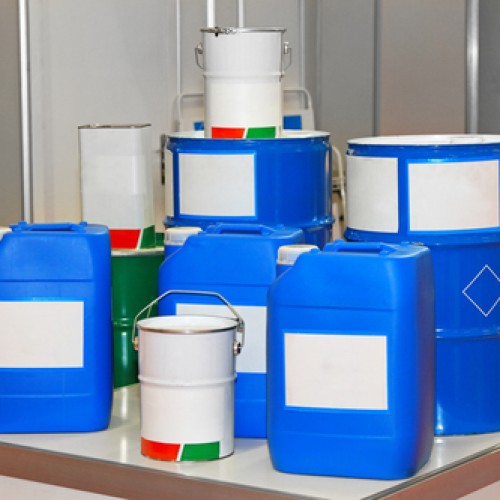





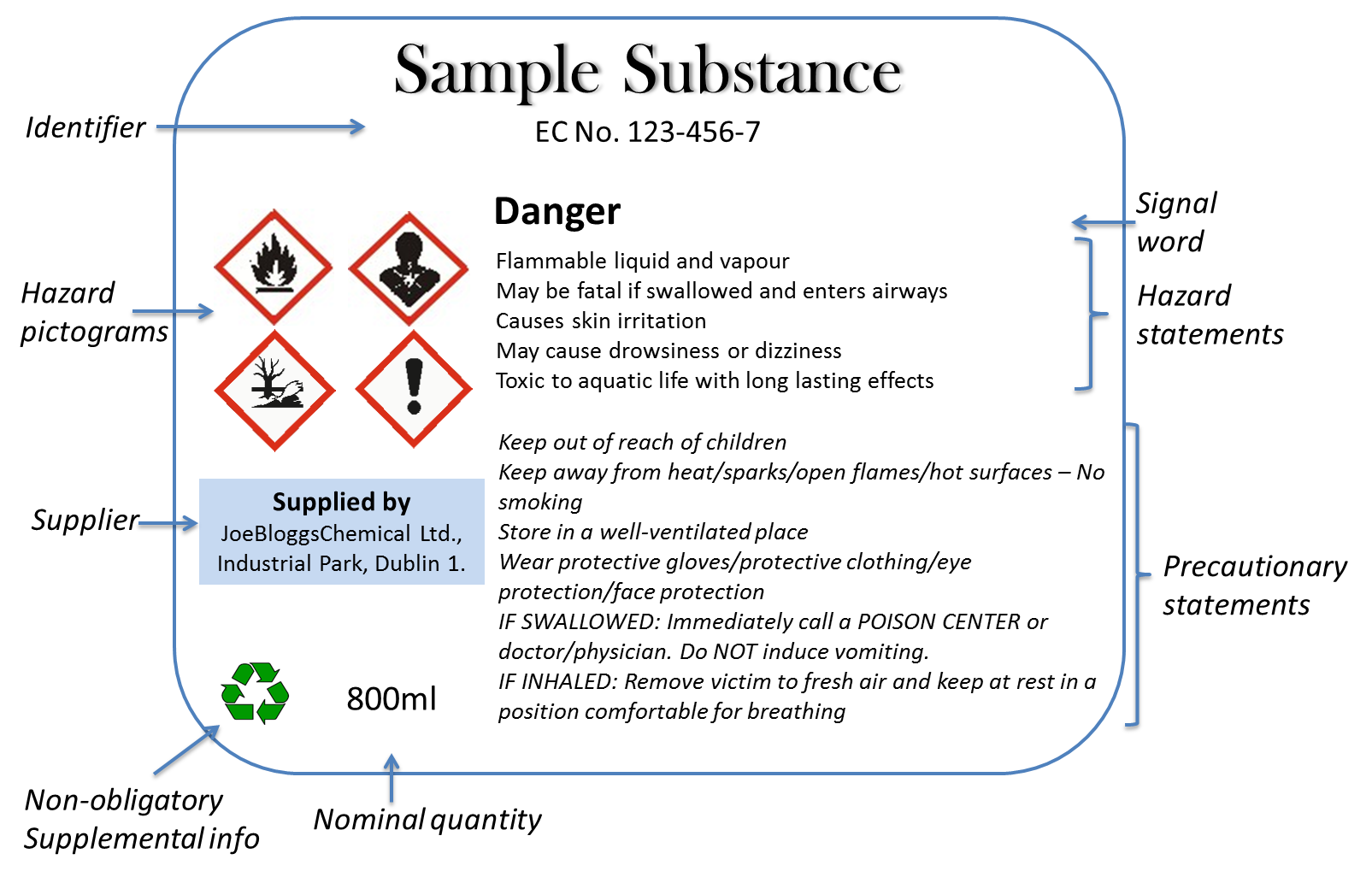
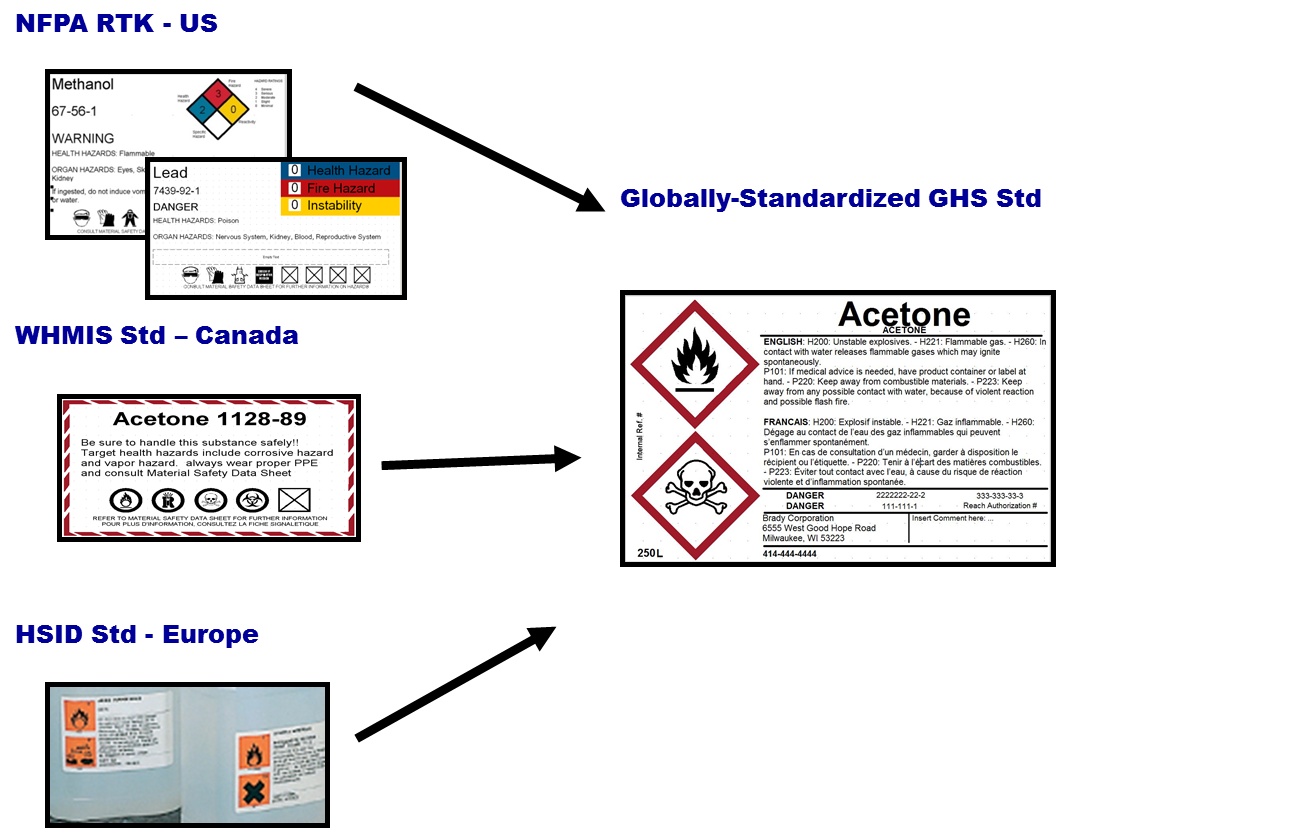



Post a Comment for "41 primary container labels of hazardous chemicals"